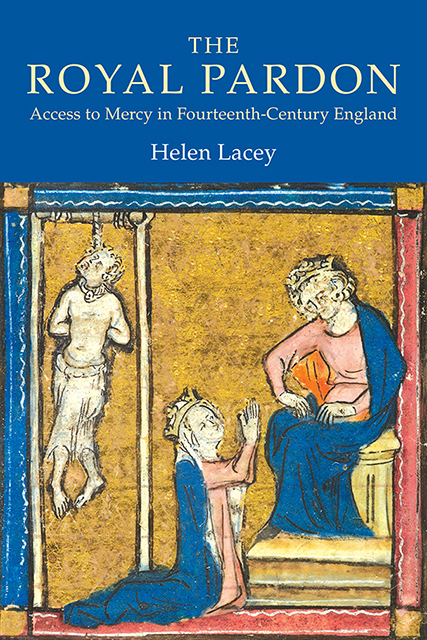Chapter Five - Monarch
Published online by Cambridge University Press: 07 March 2023
Summary
Fourteenth-century monarchs did not usually intervene in the day-to-day business of the law courts, but they did still occasionally involve themselves in the business of granting pardon. Particularly complex or unusual cases might be referred to the king for a decision ‘of grace’ (rather than the routine matters ‘of course’, which could be dealt with by the chancellor). However the surviving documentary evidence does not always help to shed light on the nature of the monarch's role in the process. It is likely that in some cases the king's decision was conveyed orally to his chancellor, and the only archival record that exists is the note that a pardon was issued. In other cases, a written petition for pardon was submitted. These petitions were often endorsed by the ‘receivers’ (men assigned to collect petitions in Parliament) with a note stipulating the course of action to be taken, and sometimes this meant they were earmarked for royal attention. Some of these petitions also record the decision made by the king in Parliament, or at a meeting of the council. Cases might also be referred to the king from his justices in the royal courts, perhaps with a recommendation for mercy. If the justices found something suspicious about a charter of pardon it was possible for them to postpone the proclamation and in the meantime consult the king. In one instance, the justices of gaol delivery at Northampton referred William Frere's case to the king when he produced two pardons, given on different dates for different offences. The king's solution in this instance was to grant a third pardon. Alternatively, the monarch himself sometimes initiated a grant of mercy; to mark a royal anniversary or a religious festival, or to reward a group of people for their service to the Crown. On such occasions the public, performative aspects of the act were of utmost importance. One such episode occurred in 1392, when Richard II famously processed through the streets of London as part of a public display of reconciliation with the civic authorities, who had recently refused to loan the Crown a substantial sum of money. As the king passed through Southwark he stopped to pardon a criminal in what was no doubt a carefully orchestrated display of mercy.
Contemporary attitudes towards the king's personal involvement in the pardoning process were expressed in a variety of medieval texts.
- Type
- Chapter
- Information
- Publisher: Boydell & BrewerPrint publication year: 2009



